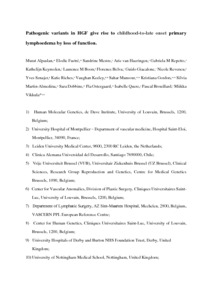Alpaslan, M;
Fastré, E;
Mestre, S;
van Haeringen, A;
Repetto, GM;
Keymolen, K;
Boon, LM;
Belva, F;
Giacalone, G;
Revencu, N;
et al.
Alpaslan, M; Fastré, E; Mestre, S; van Haeringen, A; Repetto, GM; Keymolen, K; Boon, LM; Belva, F; Giacalone, G; Revencu, N; Sznajer, Y; Riches, K; Keeley, V; Mansour, S; Gordon, K; Martin-Almedina, S; Dobbins, S; Ostergaard, P; Quere, I; Brouillard, P; Vikkula, M
(2024)
Pathogenic variants in HGF give rise to childhood-to-late onset primary lymphoedema by loss of function.
Hum Mol Genet, 33 (14).
pp. 1250-1261.
ISSN 1460-2083
https://doi.org/10.1093/hmg/ddae060
SGUL Authors: Ostergaard, Pia Mansour, Sahar Martin Almedina, Silvia
![[img]](https://openaccess.sgul.ac.uk/116594/1.hassmallThumbnailVersion/Accepted%20version.pdf)  Preview |
|
PDF
Accepted Version
Available under License ["licenses_description_publisher" not defined].
Download (1MB)
| Preview
|
Abstract
Developmental and functional defects in the lymphatic system are responsible for primary lymphoedema (PL). PL is a chronic debilitating disease caused by increased accumulation of interstitial fluid, predisposing to inflammation, infections and fibrosis. There is no cure, only symptomatic treatment is available. Thirty-two genes or loci have been linked to PL, and another 22 are suggested, including Hepatocyte Growth Factor (HGF). We searched for HGF variants in 770 index patients from the Brussels PL cohort. We identified ten variants predicted to cause HGF loss-of-function (six nonsense, two frameshifts, and two splice-site changes; 1.3% of our cohort), and 14 missense variants predicted to be pathogenic in 17 families (2.21%). We studied co-segregation within families, mRNA stability for non-sense variants, and in vitro functional effects of the missense variants. Analyses of the mRNA of patient cells revealed degradation of the nonsense mutant allele. Reduced protein secretion was detected for nine of the 14 missense variants expressed in COS-7 cells. Stimulation of lymphatic endothelial cells with these 14 HGF variant proteins resulted in decreased activation of the downstream targets AKT and ERK1/2 for three of them. Clinically, HGF-associated PL was diverse, but predominantly bilateral in the lower limbs with onset varying from early childhood to adulthood. Finally, aggregation study in a second independent cohort underscored that rare likely pathogenic variants in HGF explain about 2% of PL. Therefore, HGF signalling seems crucial for lymphatic development and/or maintenance in human beings and HGF should be included in diagnostic genetic screens for PL.
| Item Type: |
Article
|
| Additional Information: |
This is a pre-copyedited, author-produced version of an article accepted for publication in Human Molecular Genetics following peer review. The version of record Murat Alpaslan, Elodie Fastré, Sandrine Mestre, Arie van Haeringen, Gabriela M Repetto, Kathelijn Keymolen, Laurence M Boon, Florence Belva, Guido Giacalone, Nicole Revencu, Yves Sznajer, Katie Riches, Vaughan Keeley, Sahar Mansour, Kristiana Gordon, Silvia Martin-Almedina, Sara Dobbins, Pia Ostergaard, Isabelle Quere, Pascal Brouillard, Miikka Vikkula, Pathogenic variants in HGF give rise to childhood-to-late onset primary lymphoedema by loss of function, Human Molecular Genetics, Volume 33, Issue 14, 15 July 2024, Pages 1250–1261 is available online at: https://doi.org/10.1093/hmg/ddae060. |
| Keywords: |
hepatocyte growth factor, lymphatic system, primary lymphoedema, whole-exome sequencing, primary lymphoedema, hepatocyte growth factor, whole-exome sequencing, lymphatic system, 06 Biological Sciences, 11 Medical and Health Sciences, Genetics & Heredity |
| SGUL Research Institute / Research Centre: |
?? 61 ??
?? 63 ?? |
| Journal or Publication Title: |
Hum Mol Genet |
| ISSN: |
1460-2083 |
| Language: |
eng |
| Publisher License: |
Publisher's own licence |
| Projects: |
|
| PubMed ID: |
38676400 |
| Web of Science ID: |
WOS:001208696400001 |
| Dates: |
| Date |
Event |
| 2024-07-15 |
Published |
| 2024-04-26 |
Published Online |
| 2024-03-19 |
Accepted |
|
 |
Go to PubMed abstract |
| URI: |
https://openaccess.sgul.ac.uk/id/eprint/116594 |
| Publisher's version: |
https://doi.org/10.1093/hmg/ddae060 |
Statistics
Item downloaded times since 21 Jun 2024.
Actions (login required)
 |
Edit Item |



